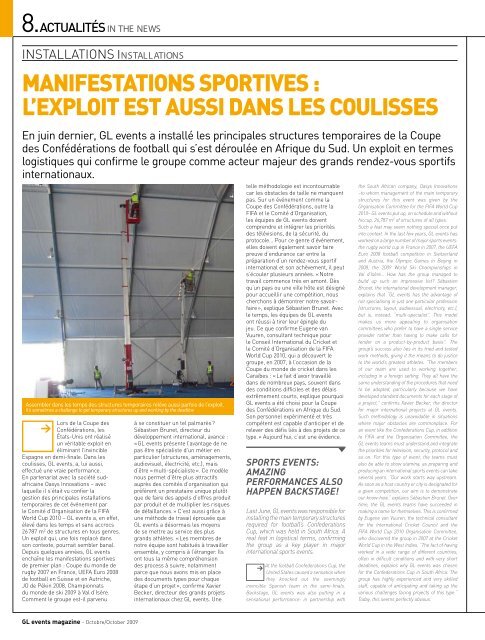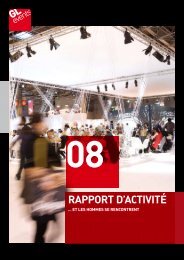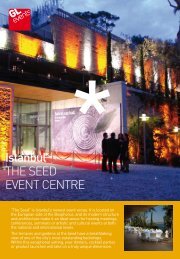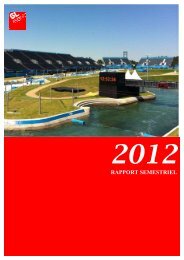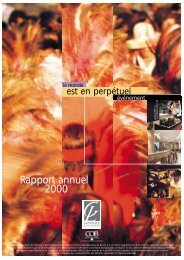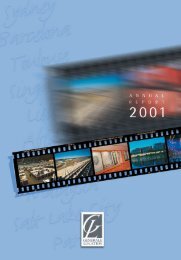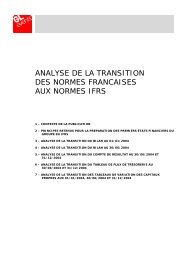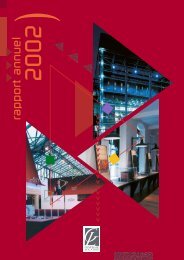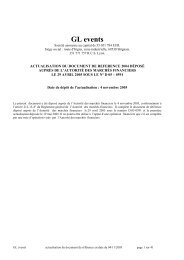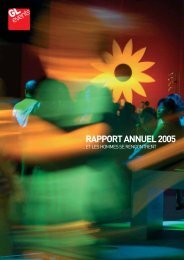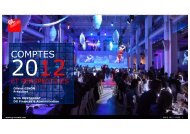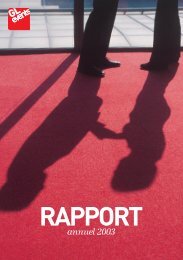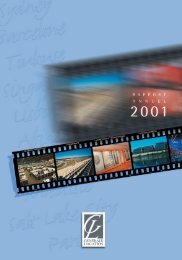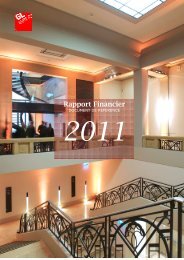l'enjeu majeur De l'événementiel - GL events
l'enjeu majeur De l'événementiel - GL events
l'enjeu majeur De l'événementiel - GL events
You also want an ePaper? Increase the reach of your titles
YUMPU automatically turns print PDFs into web optimized ePapers that Google loves.
8.ACTUALITÉS in t he n e ws<br />
Installations In s tal l at i on s<br />
Manifestations sportives :<br />
l’exploit est aussi dans les coulisses<br />
En juin dernier, <strong>GL</strong> <strong>events</strong> a installé les principales structures temporaires de la Coupe<br />
des Confédérations de football qui s’est déroulée en Afrique du Sud. Un exploit en termes<br />
logistiques qui confirme le groupe comme acteur <strong>majeur</strong> des grands rendez-vous sportifs<br />
internationaux.<br />
Assembler dans les temps des structures temporaires relève aussi parfois de l’exploit.<br />
It’s sometimes a challenge to get temporary structures up and working by the deadline<br />
Lors de la Coupe des<br />
> Confédérations, les<br />
États-Unis ont réalisé<br />
un véritable exploit en<br />
éliminant l’invincible<br />
Espagne en demi-finale. Dans les<br />
coulisses, <strong>GL</strong> <strong>events</strong>, a, lui aussi,<br />
effectué une vraie performance.<br />
En partenariat avec la société sudafricaine<br />
Oasys Innovations – avec<br />
laquelle il s’était vu confier la<br />
gestion des principales installations<br />
temporaires de cet événement par<br />
le Comité d’Organisation de la FIFA<br />
World Cup 2010 – <strong>GL</strong> <strong>events</strong> a, en effet,<br />
élevé dans les temps et sans accrocs<br />
26787 m 2 de structures en tous genres.<br />
Un exploit qui, une fois replacé dans<br />
son contexte, pourrait sembler banal.<br />
<strong>De</strong>puis quelques années, <strong>GL</strong> <strong>events</strong><br />
enchaîne les manifestations sportives<br />
de premier plan : Coupe du monde de<br />
rugby 2007 en France, UEFA Euro 2008<br />
de football en Suisse et en Autriche,<br />
JO de Pékin 2008, Championnats<br />
du monde de ski 2009 à Val d’Isère.<br />
Comment le groupe est-il parvenu<br />
à se constituer un tel palmarès ?<br />
Sébastien Brunet, directeur du<br />
développement international, avance :<br />
« <strong>GL</strong> <strong>events</strong> présente l’avantage de ne<br />
pas être spécialiste d’un métier en<br />
particulier (structures, aménagements,<br />
audiovisuel, électricité, etc.), mais<br />
d’être « multi-spécialiste ». Ce modèle<br />
nous permet d’être plus attractifs<br />
auprès des comités d’organisation qui<br />
préfèrent un prestataire unique plutôt<br />
que de faire des appels d’offres produit<br />
par produit et de multiplier les risques<br />
de défaillances. » C’est aussi grâce à<br />
une méthode de travail éprouvée que<br />
<strong>GL</strong> <strong>events</strong> a désormais les moyens<br />
de se mettre au service des plus<br />
grands athlètes. « Les membres de<br />
notre équipe sont habitués à travailler<br />
ensemble, y compris à l’étranger. Ils<br />
ont tous la même compréhension<br />
des process à suivre, notamment<br />
parce que nous avons mis en place<br />
des documents types pour chaque<br />
étape d’un projet », confirme Xavier<br />
Becker, directeur des grands projets<br />
internationaux chez <strong>GL</strong> <strong>events</strong>. Une<br />
telle méthodologie est incontournable<br />
car les obstacles de taille ne manquent<br />
pas. Sur un événement comme la<br />
Coupe des Confédérations, outre la<br />
FIFA et le Comité d’Organisation,<br />
les équipes de <strong>GL</strong> <strong>events</strong> doivent<br />
comprendre et intégrer les priorités<br />
des télévisions, de la sécurité, du<br />
protocole… Pour ce genre d’événement,<br />
elles doivent également savoir faire<br />
preuve d’endurance car entre la<br />
préparation d’un rendez-vous sportif<br />
international et son achèvement, il peut<br />
s’écouler plusieurs années. « Notre<br />
travail commence très en amont. Dès<br />
qu’un pays ou une ville hôte est désigné<br />
pour accueillir une compétition, nous<br />
cherchons à démontrer notre savoirfaire<br />
», explique Sébastien Brunet. Avec<br />
le temps, les équipes de <strong>GL</strong> <strong>events</strong><br />
ont réussi à tirer leur épingle du<br />
jeu. Ce que confirme Eugene van<br />
Vuuren, consultant technique pour<br />
le Conseil International du Cricket et<br />
le Comité d’Organisation de la FIFA<br />
World Cup 2010, qui a découvert le<br />
groupe, en 2007, à l’occasion de la<br />
Coupe du monde de cricket dans les<br />
Caraïbes : « Le fait d’avoir travaillé<br />
dans de nombreux pays, souvent dans<br />
des conditions difficiles et des délais<br />
extrêmement courts, explique pourquoi<br />
<strong>GL</strong> <strong>events</strong> a été choisi pour la Coupe<br />
des Confédérations en Afrique du Sud.<br />
Son personnel expérimenté et très<br />
compétent est capable d’anticiper et de<br />
relever des défis liés à des projets de ce<br />
type. » Aujourd’hui, c’est une évidence.<br />
Sports <strong>events</strong>:<br />
amazing<br />
performances also<br />
happen backstage!<br />
Last June, <strong>GL</strong> <strong>events</strong> was responsible for<br />
installing the main temporary structures<br />
required for football’s Confederations<br />
Cup, which was held in South Africa. A<br />
real feat in logistical terms, confirming<br />
the group as a key player in major<br />
international sports <strong>events</strong>.<br />
At the football Confederations Cup, the<br />
><br />
United States caused a sensation when<br />
they knocked out the seemingly<br />
invincible Spanish team in the semi-finals.<br />
Backstage, <strong>GL</strong> <strong>events</strong> was also putting in a<br />
sensational performance: in partnership with<br />
the South African company, Oasys Innovations<br />
–to whom management of the main temporary<br />
structures for this event was given by the<br />
Organisation Committee for the FIFA World Cup<br />
2010– <strong>GL</strong> <strong>events</strong> put up, on schedule and without<br />
hiccup, 26,787 m 2 of structures of all types.<br />
Such a feat may seem nothing special once put<br />
into context. In the last few years, <strong>GL</strong> <strong>events</strong> has<br />
worked on a large number of major sports <strong>events</strong>:<br />
the rugby world cup in France in 2007, the UEFA<br />
Euro 2008 football competition in Switzerland<br />
and Austria, the Olympic Games in Beijing in<br />
2008, the 2009 World Ski Championships in<br />
Val d’Isère… How has the group managed to<br />
build up such an impressive list? Sébastien<br />
Brunet, the international development manager,<br />
explains that “<strong>GL</strong> <strong>events</strong> has the advantage of<br />
not specialising in just one particular profession<br />
(structures, layout, audiovisual, electricity, etc.),<br />
but is, instead, “multi-specialist”. This model<br />
makes us more appealing to organisation<br />
committees who prefer to have a single service<br />
provider rather than having to make calls for<br />
tender on a product-by-product basis”. The<br />
group’s success also lies in its tried and tested<br />
work methods, giving it the means to do justice<br />
to the world’s greatest athletes. “The members<br />
of our team are used to working together,<br />
including in a foreign setting. They all have the<br />
same understanding of the procedures that need<br />
to be adopted, particularly because we have<br />
developed standard documents for each stage of<br />
a project,” confirms Xavier Becker, the director<br />
for major international projects at <strong>GL</strong> <strong>events</strong>.<br />
Such methodology is unavoidable in situations<br />
where major obstacles are commonplace. For<br />
an event like the Confederations Cup, in addition<br />
to FIFA and the Organisation Committee, the<br />
<strong>GL</strong> <strong>events</strong> teams must understand and integrate<br />
the priorities for television, security, protocol and<br />
so on. For this type of event, the teams must<br />
also be able to show stamina, as preparing and<br />
producing an international sports <strong>events</strong> can take<br />
several years. “Our work starts way upstream.<br />
As soon as a host country or city is designated for<br />
a given competition, our aim is to demonstrate<br />
our know-how,” explains Sébastien Brunet. Over<br />
time, the <strong>GL</strong> <strong>events</strong> teams have succeeded in<br />
making a name for themselves. This is confirmed<br />
by Eugene van Vuuren, the technical consultant<br />
for the International Cricket Council and the<br />
FIFA World Cup 2010 Organisation Committee,<br />
who discovered the group in 2007 at the Cricket<br />
World Cup in the West Indies, “The fact of having<br />
worked in a wide range of different countries,<br />
often in difficult conditions and with very short<br />
deadlines, explains why <strong>GL</strong> <strong>events</strong> was chosen<br />
for the Confederations Cup in South Africa. The<br />
group has highly experienced and very skilled<br />
staff, capable of anticipating and taking up the<br />
various challenges facing projects of this type.”<br />
Today, this seems perfectly obvious.<br />
<strong>GL</strong> <strong>events</strong> magazine - Octobre/October 2009<br />
* <strong>De</strong>puis le 11 mai 2007, le groupe Michelin est dirigé par Michel Rollier, Didier Miraton<br />
et Jean-Dominique Sénard.


